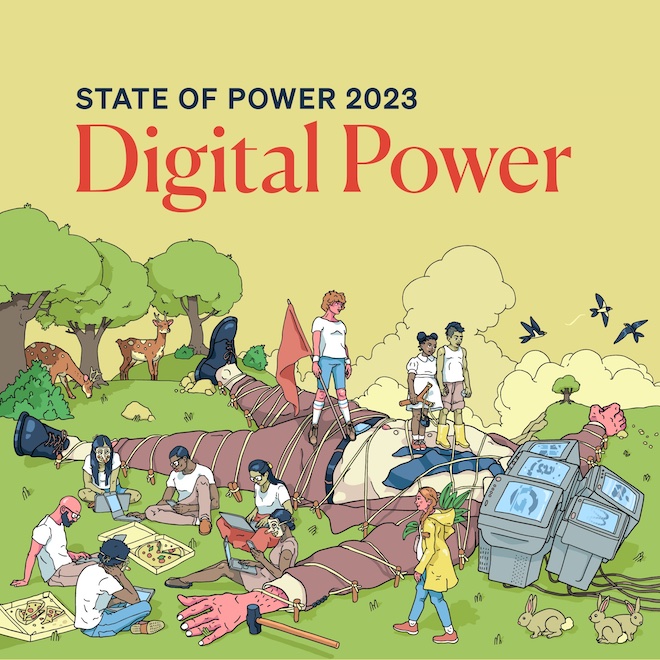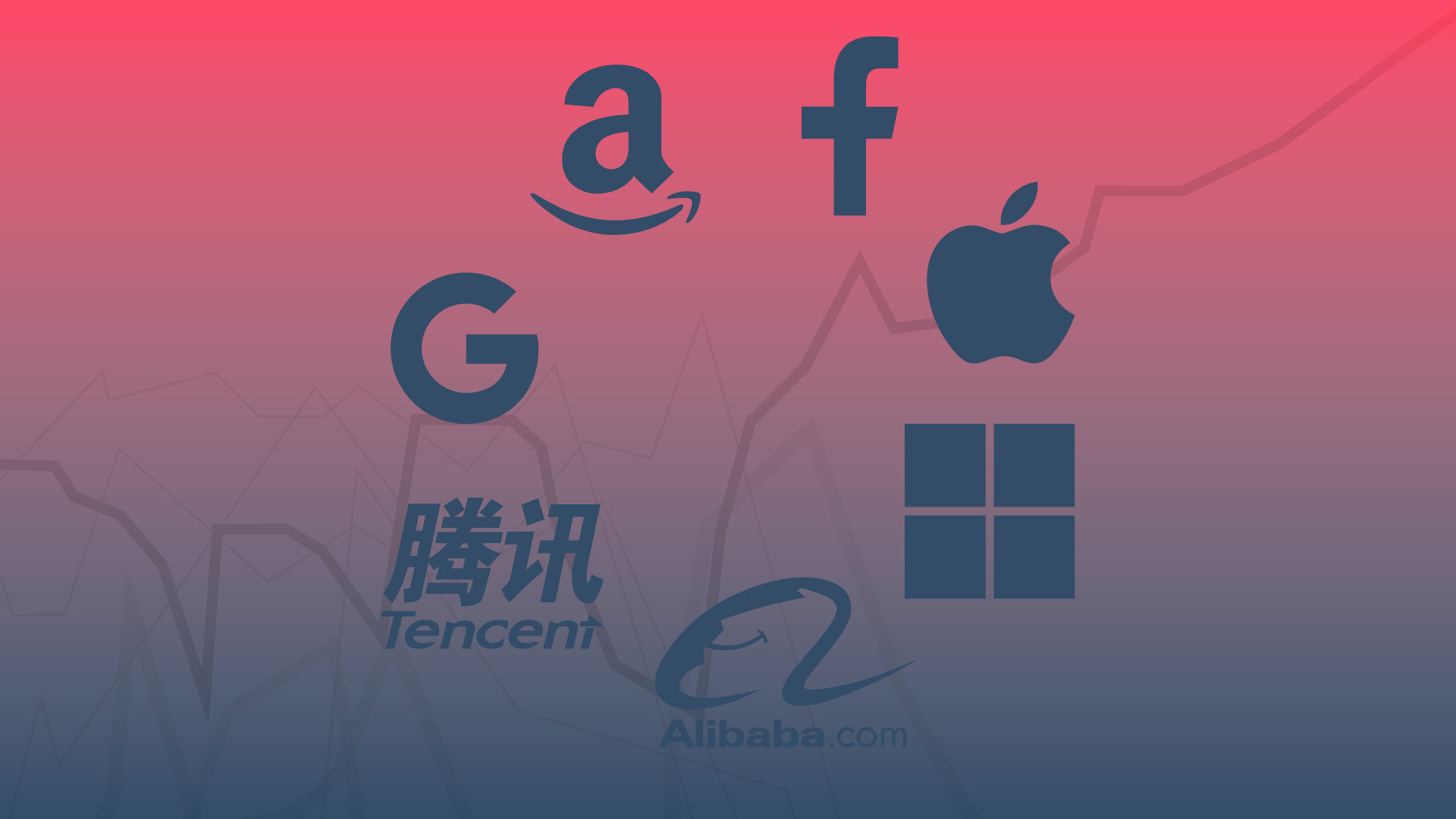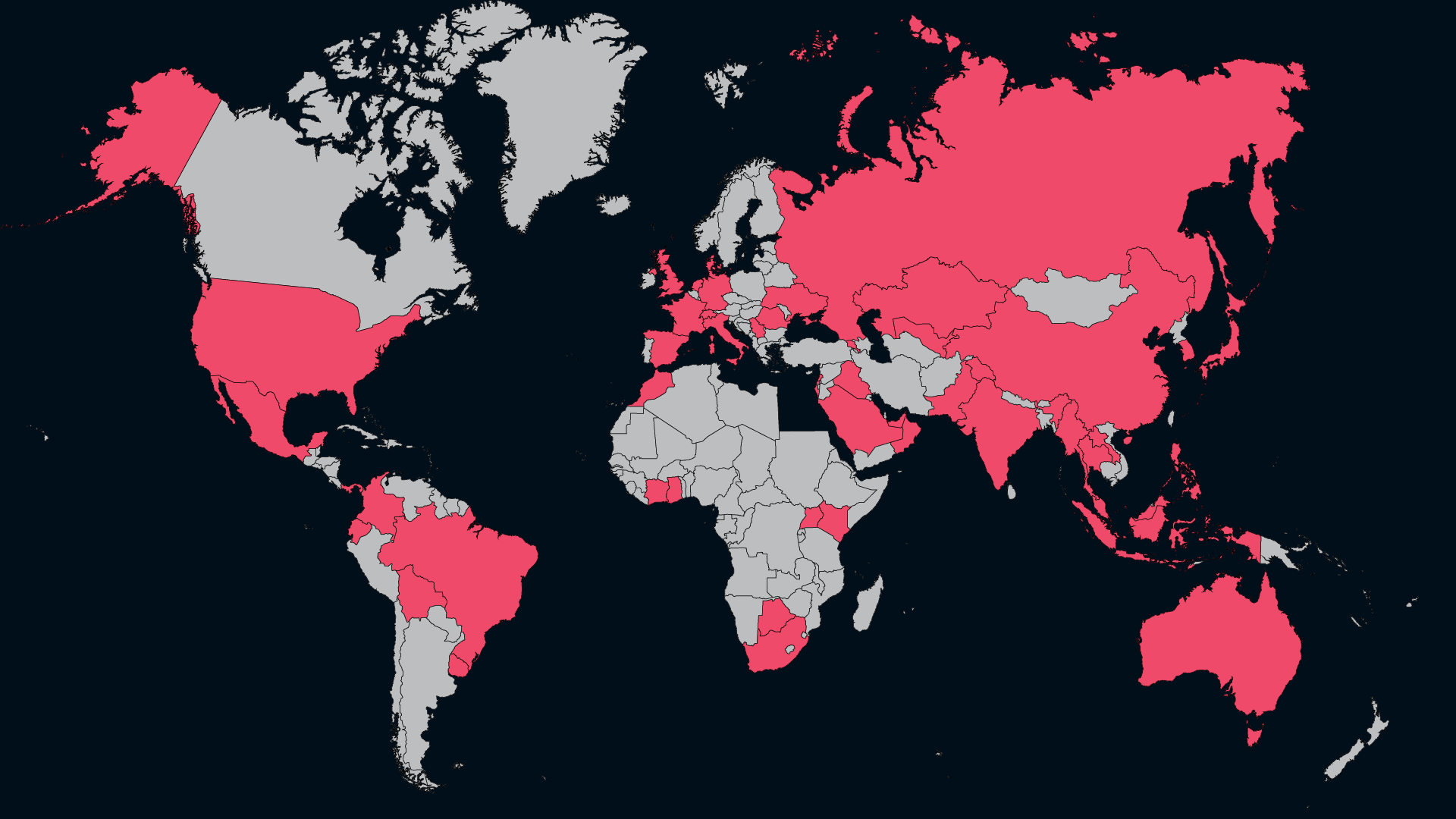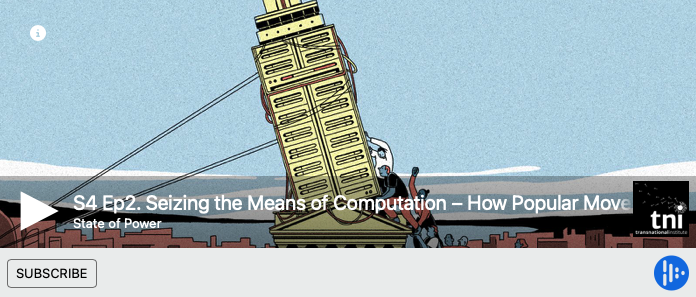|
TNI’s 11th flagship State of Power report exposes the actors, the strategies and the implications of this digital power grab, and shares ideas on how movements might bring technology back under popular control.
Was this forwarded to you? Sign up
here
|
|

Big Tech has concentrated vast economic power with the collusion of states, which has resulted in expanded surveillance, spiraling disinformation and weakened workers' rights. TNI’s 11th flagship State of Power report exposes the actors, the strategies and the implications of this digital power grab, and shares ideas on how movements might bring technology back under popular control.
|
|
|
|
|

Geopolitics of digital power
|

Big Tech - The rise of GAFAAMT
|

Surveillance society
|

Digital counterpower
|
|
|
|
| |
| Seizing the means of computation – how popular movements can topple Big Tech monopolies |
|
Interview with Cory Doctorow
Cory Doctorow is a brilliant science fiction novelist, journalist and technology activist and co-author of Chokepoint Capitalism. In one of the best interviews TNI has ever done for State of Power, Cory clarifies the nature of Big Tech's dominance and provides hope about our capacity to rein in their power.
> Read online
|
|
|
| There Are No Markets Anymore: From Neoliberalism to Big Tech |
|
Kean Birch
Big Tech’s power is not just due to their size, but because they collect, control and monetise the very information we need for markets to function. They have become markets unto themselves. Reining them will require thinking that goes beyond regulation.
> Read online
|
|
|
| Holding the strings: The role of finance in shaping Big Tech |
|
Nils Peters
The power of Big Tech can not be understood without examining its financial backers. Venture capital has encouraged hype and speculation and motivated platforms to monopolise audiences and squeeze workers’ pay and rights.
> Read online
|
|
|
| Militarising Big Tech: The Rise of Silicon Valley’s Digital Defence Industry |
|
Roberto J. González
In the US, Big Tech and the Military are increasingly fused, brought together by finance, joint projects, research and infrastructure. Untying the knot will be key to prevent endless wars abroad and militarised policing at home.
> Read online
|
 |
|
|
| Abolitionist creativity: How intellectual property can hack digital power |
|
Julia Choucair Vizoso and Chris Byrnes
Corporations’ wealth is increasingly built on intangible intellectual property (IP) rights rather than hard assets. What if we could hack these legal and economic codes that underpin capitalism so that they are based on human rights, worker solidarity, ecological sustainability and community wealth building?
> Read online
|
|
|
| Digital capitalism is a mine not a cloud: Exploring the extractivism at the root of the data economy |
|
Maximilian Jung
Big Tech seeks through abstractions of the ‘cloud’ to hide the depletion of nature and the exploitation and surveillance of labour that lies at the heart of its project to commodify data.
> Read online
|
|
|
| What Artificial Intelligence is hiding: Microsoft and vulnerable girls in northern Argentina |
|
Karina Pedace, Tomás Balmaceda, Tobías J. Schleider
In 2017, the governor of Salta, Argentina, signed a project with Microsoft to use AI to prevent teenage pregnancies. The project's failure and its violations of privacy and human rights points to the dangers of relying on AI to tackle social and environmental issues.
> Read online
|
|
|
| The Everywhere Border: Digital migration control infrastructure in the Americas |
|
Mizue Aizeki, Laura Bingham, Santiago Narváez
The US is building a digital border infrastructure in neighbouring countries that expands and deepens surveillance, while hiding state violence. The implications of this new infrastructure will be long-lasting and need to be integrated into strategies of resistance of migrant justice movements worldwide.
>Read online
|
|
|
| Tying up Goliath: Activist strategies for confronting and harnessing digital power |
|
Anastasia Kavada, Tina Askanius, Anne Kaun, Alice Mattoni, Julie Uldam
In recent years, the Right has been more successful at using digital tools than progressive movements. What are the strategies and tactics, progressive movements can use to build digital counter-power?
>Read online
|
|
|
| How popular movements can topple Big Tech monopolies: In Conversation with Cory Doctorow |
|
 Cory Doctorow, Nick Buxton, Shaun Matsheza - Our guest on the podcast is Cory Doctorow, a brilliant science fiction novelist, journalist and technology activist. This is the full-form audio interview with Cory. A #mustlisten!
Cory Doctorow, Nick Buxton, Shaun Matsheza - Our guest on the podcast is Cory Doctorow, a brilliant science fiction novelist, journalist and technology activist. This is the full-form audio interview with Cory. A #mustlisten!
> Listen
|
|
|
|
| Seeing The World Like A Palestinian: Intersectional Struggles Against Big Tech and Israeli Apartheid |
|
Apoorva PG
With collaboration of Big Tech, Israeli state has rolled out ever more digital tools to spy, surveil and repress Palestinians in order to entrench its apartheid rule. Palestine is at the sharp end of digital colonialism and therefore a critical place for global resistance to begin.
> Read online
|
| Guest essays in collaboration with IT for Change
|
| Capitalism in the Age of Intellectual Monopoly |
|
Cecilia Rikap and Cedric Durand
Current regulation is too limited and superficial to address the intellectual monopoly power of Big Tech. We need to create a commons approach that democratises control of data, algorithms, and digital infrastructure.
> Read online |
 |
|
|
| Changing Dynamics of Labor and Capital |
|
Jai Vipra
Labor’s ability to negotiate with capital has reduced because of work mediated by Big Tech. A workers’ agenda must include algorithm regulation, data and financial rights of workers.
> Read online
|
|
|
| Big Tech and the Smartification of Agriculture |
|
Felix Maschewski and Anna-Verena Nosthoff
The growth of AgTech is already reshaping agriculture, further concentrating power in the hands of Big Ag and Big Tech players such as Alphabet and Amazon.
> Read online
|
|
|
| Web3 and the Metaverse: Which Way for the Web? |
|
James Muldoon
The hype for virtual worlds and blockchain technologies is about monetising online communities and will further consolidate the power of Big Tech. We need an alternative pluralistic approach that seeks to build an ecosystem of alternative social ownership structures from the local level right up to the national and international levels.
> Read online
|
|
|
| Centering Society in Big Tech Reform |
|
Richard Hill
What have been the historical approaches to governing the internet up to now, and how might we build new models based around the internet as a public good? A very useful overview of the history of governance led by Big Tech and the options for emancipatory democratic alternatives.
> Read online
|
|
|
|
| Illustrating Digital Power |
|
Zoran Svilar and Anđela Janković
For TNI’s 11th State of Power report, TNI was privileged to work with two brilliant artists from Serbia. Here we introduce them and their work and also their reflections on working on the project.
The infographics were done by Evan Clayburg.
> Read online |
|
| |
|
|
|
| |